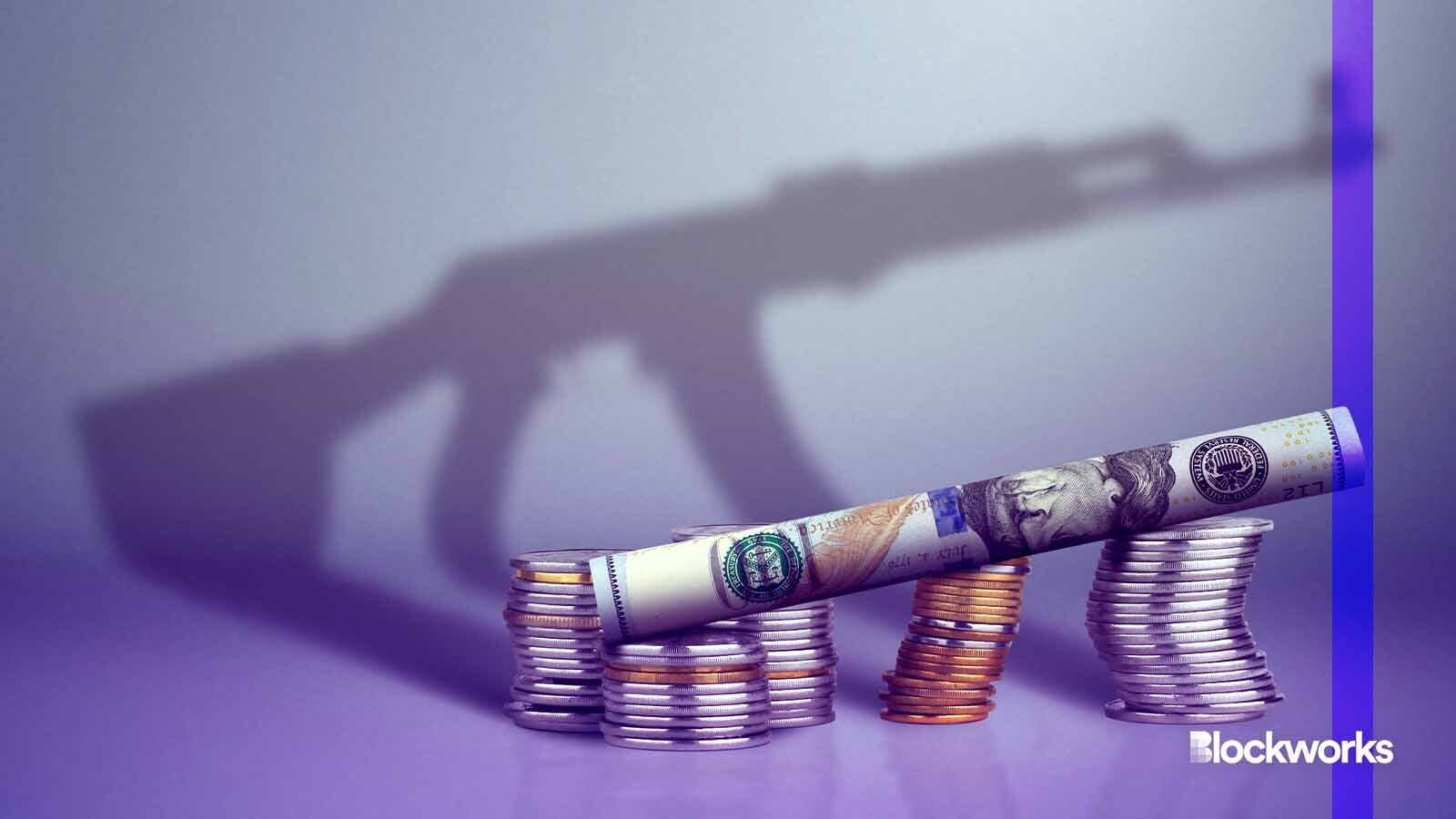Phones and the internet aren’t blamed for terror finance. Crypto shouldn’t either.
Crypto needs the same nuance like any other technology used today by illicit actors

Dimj/Shutterstock modified by Blockworks
Hamas’ blatant terrorist aggression that claimed more than 1,400 lives and the graphic videos emerging from Israel triggered vivid memories for me. Growing up in the suburbs of New York City, my friends and family were directly impacted by the atrocities of Sept. 11, 2001. As a Marine Officer, some of my closest friends were killed and wounded in the wars that followed.
In 2004, I served in the hell of Ar Ramadi, Iraq. By that time, Al Qaeda had infiltrated the city, inflicting unspeakable and gruesome acts of terror on its residents, and in my Marine Corps infantry unit, the casualties mounted.
Having witnessed these horrors, I have no tolerance for terrorism and condemn those who fund it. But while it may be politically convenient to blame the poorly understood cryptocurrency industry for playing a role in the attack, this blatantly ignores facts of public record.
A Wall Street Journal article on Hamas financing overstated one crypto wallet’s potential terrorism funding activity at $82 million versus the more likely $475,000 calculated by Chainalysis. Elliptic refuted the WSJ’s story as well, stating, “There is no evidence to support the assertion that Hamas has received significant volumes of crypto donations.”
Claims about crypto terrorism financing are misinformed and dangerous. They distract us from the people who are committing the crimes themselves, ironically casting blame on a transparent technology that can itself play an important role in solving legacy shortfalls.
Instead, the recent terrorist attacks in Israel should be a wake up call to the abject failure of the intelligence community and the ineffectiveness of our current illicit finance policies. We know how Hamas makes money; according to Forbes, Hamas’ annual turnover of $1 billion is largely funded by taxes and fees, financial aid and donations. Iran provides an estimated $100 million in fiat, with donations from Qatar and Turkey playing a role as well.
As a designated terrorist entity, Hamas is, of course, subject to sanctions and has been restricted from the global banking system. But this isn’t holding them back from generating nearly the entirety of their funding from traditional means.
No amount of funding for terrorism is acceptable, and individuals and organizations that participate in illicit financing should be pursued, investigated and held accountable for their role in perpetuating terrorism.
Recent regulatory allegations against Binance revealed internal documents including jokes about the likelihood of Hamas using the platform, suggesting Hamas “can barely buy an AK-47 with 600 bucks.” For those of us who have been on the receiving end of enemy AK-47’s, it’s really not so funny.
While Binance has subsequently frozen hundreds of crypto accounts associated with Hamas, the sanctions failures of a centralized exchange like Binance should not represent the entirety of the cryptocurrency industry — because crypto and blockchain technologies actually deliver an enhanced ability to transparently observe and ultimately root out those responsible for illicit transactions.
Many traditional banks have failed miserably with their compliance using decades-old sanctions rules, and fiat dollars are very difficult to trace. BNP Paribas and HSBC paid nearly $8.9 billion and $1.3 billion respectively for concealing and conducting transactions on behalf of sanctioned customers, including Iran. Even Berkshire Hathaway, with its crypto-skeptic Vice Chairman Charlie Munger, was fined for “egregious” violations of US sanctions on Iran in 2020.
The failures of the emerging crypto industry are dwarfed by the failures of the traditional financial sector — yet somehow, crypto emerged as an easy scapegoat.
But transparent and immutable public blockchains are simply terrible technology for illicit finance. Hamas knows this; in recent years, Israeli law enforcement froze and seized millions in crypto funds controlled by entities affiliated with Hamas. In April 2023, the terror organization stopped accepting donations in Bitcoin, citing concerns about the safety and well being of its donors.
Read more from our opinion section: Yes, criminals use crypto. No, don’t blame the developers.
Today, advanced blockchain analytics firms are providing cutting edge capabilities to effectively identify and disrupt the illicit flow of funds. According to blockchain analytics firm Chainalysis, just 0.24% of blockchain transactions in 2022 were illicit. Transactions on public blockchains are a honeypot of intelligence and allow law enforcement and intelligence agencies to better identify the source of illicit funds. As Web3 cyberthreat intelligence firm Cloudburst Technologies has stated, “Illicit actors don’t organize and plan their operations on the blockchain — they do it in the Deep and Dark Web.”
While some politicians may be attempting to regulate the crypto industry out of existence, demonizing, sanctioning and condemning technology is a slippery slope. Terrorists have proven adept at using technology like mobile phones and the internet to coordinate, finance and perpetrate their horrific acts. So, why haven’t these technologies been exorcized and legislated out of existence, too? Is a blockchain non-proliferation treaty the right policy outcome? Both suggestions are laughable.
Deflecting blame, scapegoating and censoring the blockchain industry is a lazy approach and dangerous distraction from addressing our institutional failures head on. Instead, policymakers should be focusing on enforcement against those that actually fund terrorism, rather than indict a technology that promises to help them.
Get the news in your inbox. Explore Blockworks newsletters:
- The Breakdown: Decoding crypto and the markets. Daily.
- 0xResearch: Alpha in your inbox. Think like an analyst.






